
She burst into the online music learning space some years ago, and today, Lisa Witt is the face of Pianote and an icon in the piano learning community. She inspires hundreds (if not thousands, if not millions!) of aspiring musicians, teaching them that they can play piano.
Lisa was recently promoted to Vice President of the Pianote brand. Today (May 11) is also her birthday! So we’re celebrating with a deep dive interview. The following is an edited and condensed conversation between Lisa Witt and Charmaine Li, the editor of this blog. It’s a pretty long chat so we’ve broken it up into six parts. Sit back, relax, and join us on Lisa’s journey!
Table of Contents:
Get exclusive interviews, fascinating articles, and inspiring lessons delivered straight to your inbox.
I probably didn’t stand a chance at not being drawn to music. Music was just part of the family experience. When we went to my grandparents’ house, before we ate, we didn’t speak our prayers—we sang our prayers. And we’d often sing it like a round, or there’d be a harmony we’d have to find. Or Grandpa would get on the piano.
I can remember mashing the keys on the piano my grandparents had against the wall and being told to stop—it’s one of my earliest memories. That and hearing my grandpa play made me want to learn, so I started asking for piano lessons when I was five or six. Then, around the time I turned eight or nine, my grandparents showed up with a piano in the back of their truck and unloaded it into our house! And I got signed up for piano lessons three doors down.
I can remember walking with my little books down the road and feeling so nervous because I was a really shy child. I honestly hated the lessons within a couple of months, but my parents would not let me quit.
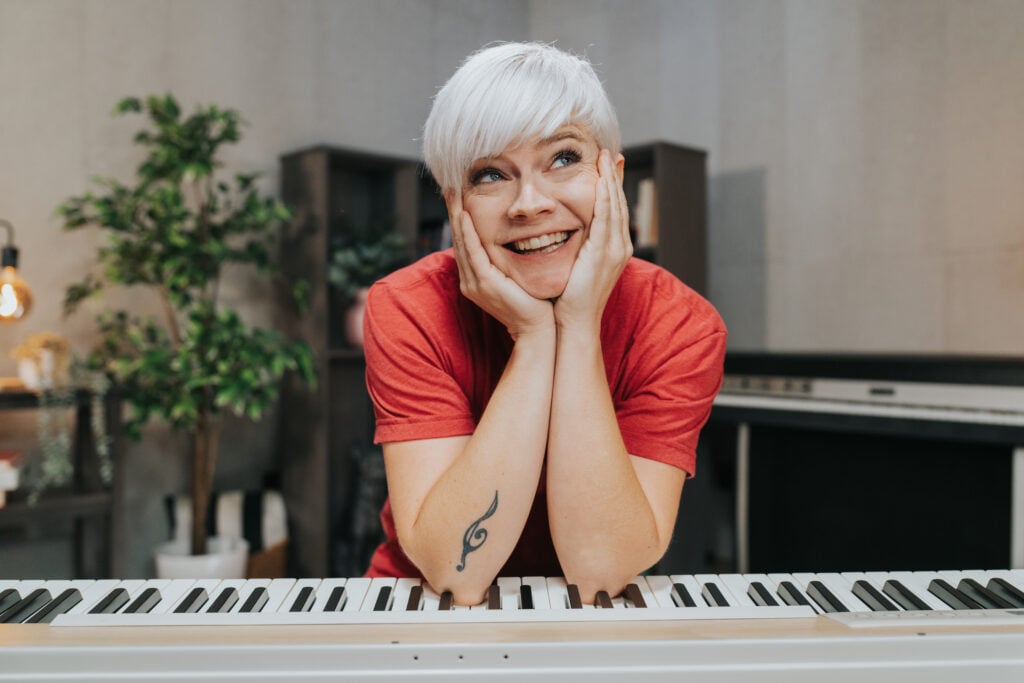
Well, first and foremost, learning something is work!
When we experience music, it looks so easy. Because music is painted to be so positive (and it is), we expect that learning to create music will be all positive. But I don’t think that’s realistic.
I also didn’t want to play pieces that I didn’t emotionally connect with. And my teachers didn’t encourage me to use my ear or learn to improvise. It wasn’t because they were bad teachers; they just didn’t know.
I would play something incorrectly (because I avoided reading notes whenever possible!) and be like, “Oh, this sounds right.” But it wasn’t. And my response was always: “But it sounds better!” It would have been amazing if my teacher had said, “Oh, you seem to have a great ear for creativity or composition. If you could rewrite this piece, what would it sound like?”
I think that would have unlocked the piano for me in a different and more meaningful way. But it didn’t happen at that part of my journey and that’s okay.
That happened with the internet! This was pre Ultimate Guitar, but you could find lyrics with chords over them.
I was playing at church in a youth band, and the guitarist was like: you just play chords like this. I put the pieces together and I started to plunk down chords, sing, and play.
And I went, “Oh my gosh, THIS is how they do it.” Like, this is how all the people I’ve been admiring—all the songwriters, all these musicians—this is how they’re approaching the instrument!
I was pretty hooked from there. And I was thankful for all the work I put into practicing my triad inversions and arpeggios. Because suddenly, they had a purpose.
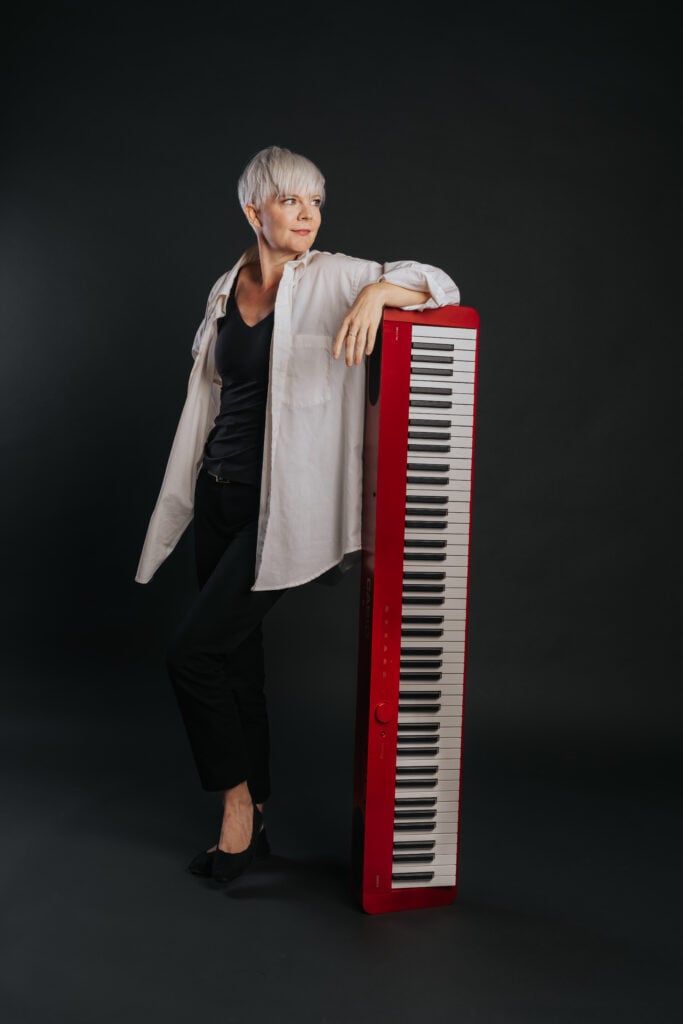
Yeah. I grew up in the church and it was just what you did. It was a part of my experience in a very different way than RCM. It also provided that means to an end: if you’re playing on Sunday, you have to show up to practice on Thursday. So, there were checkpoints where I had a specific thing I had to do, and my skills developed because of those little goalposts.
Exactly. And nobody was a professional musician!
I think I started teaching when I was 16, maybe 17. Just casually here and there.
Then I graduated, and I was really fascinated with the brain and psychology. I was like, I’m gonna go to school and become a psychologist! So I went to my first semester and taught on the side.
And there was this moment when I realized I really hate school! And that I’ll probably make less money with my degree than I’m currently making teaching piano lessons.
So I made the decision to dig into early childhood music education. There are these classes called Music for Young Children (MYC). I was really intrigued by them because my baby sister (who’s 13 years younger than me) was taking these lessons. She was four or five and this kid could recognize intervals and play sheet music!
So I took the teacher training. These kids were being taught music through movement—they would be sitting, standing, be at their keyboards, making crafts… It was so holistic.
I learned that sight reading could be done through patterns. I loved it, and I got my teacher certification and started group classes. I also taught private lessons for bigger kids.
Loving this content? Subscribe to The Note for more quick tips, cheat sheets, explainers, and other stuff piano players love. Delivered to your inbox for free.
Eventually, I was contacted by a family who had…I think 23 children? They had adopted and foster kids and they wanted me to come teach at their house. Many of these kids came from trauma or had developmental, physical, all kinds of disabilities.
I began to see what happens when a child finds their voice. Long story short, I connected with the Ministry of Children and Family Development to run a music therapy program for kids under four who were in foster care, who had experienced trauma. We used singing, dance, movement, rhythm, and all kinds of modalities in this group class with the child’s caregiver.
There was some brain mapping involved, and we noticed that these kids were developing a way healthier level of attachment with the person they were in that musical experience with. They were sleeping better and, in cases where we had nonverbal children, they were adding words to their vocabulary.
So we ran this program for a little while, and if I wasn’t already a believer in the power of music… There’s magic here that we haven’t even tapped into.
It was around the time when more people were creating YouTube channels. Influencers hadn’t really become a thing yet, but online learning was starting to. And so, I had been considering finding a way to share what I knew—creating a YouTube channel or something like that.
Jame, who is our CEO now, was the bass player at our church. We were talking after practice one night and he was like, “Hey, would you be interested in coming in and filming some lessons? My brother and I, we’re starting piano lessons online.”
So they brought me in and I sat in Studio A and played our iconic Roland V-Grand. I remember seeing it in the studio and being like, THIS is my dream instrument! I was just delighted and enamored with it.
I filmed some lessons for the first Foundations. I had no idea what I was doing…but I did it! And then they had me back and I was like, I have this idea: I want to teach people how to do chords. So we ended up creating Chord Hacks, which is still one of our most popular free things.
And the rest is kinda history.
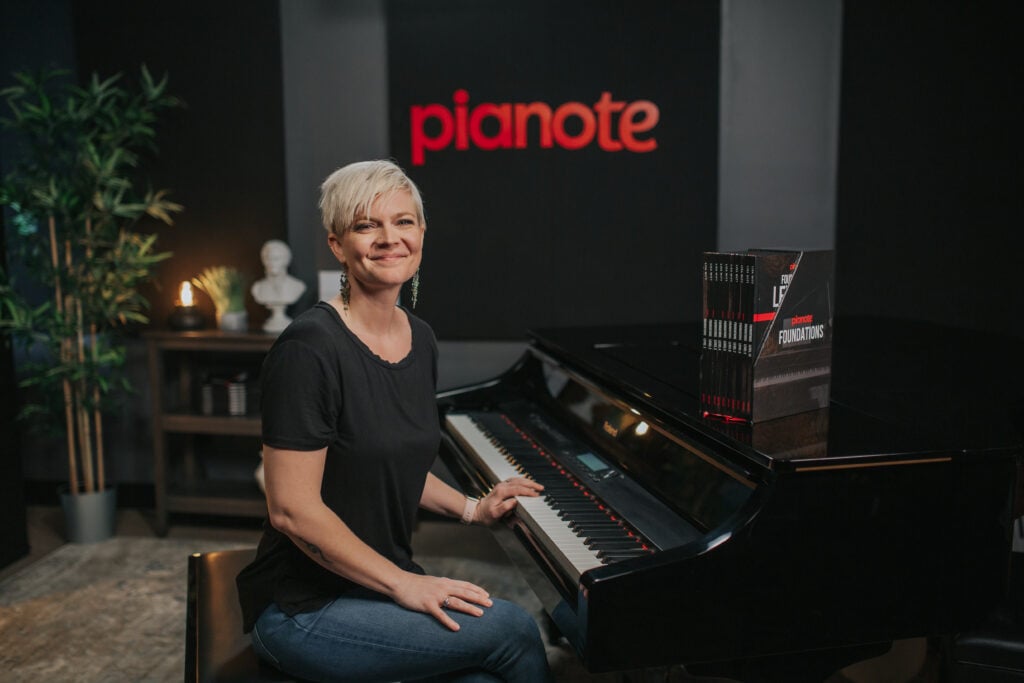
That came a little bit later. It’s such a beautiful memory when I think about those early days because I had no clue what I was doing. I wasn’t in the future and I wasn’t in the past. With this role I was very much like: “What do I want to share today?” I wasn’t thinking about getting a million views. And that’s where “Create Emotion” sort of happened.
Scott (Pianote’s Marketing Director) had come on and he was like, “It’d be cool to do a video on these notes, this is a really pretty sound.” And I was like, “Oh… Let’s do a lesson!” And next thing you know, cameras are on and our first big video ends up happening.
It wasn’t anything other than: here’s something beautiful anybody can go play. And now, as a result of that, all these people—millions of people—have had this experience that made them feel like they can actually create something beautiful. That there isn’t a barrier.
Boom.
I think…if my dreams were to come true, then when people think about the piano in general, that Pianote is part of their “thought bubble.”
I think we’re at this really important moment in music education, especially as it relates to the piano. The traditional ways of learning are still incredible and serve a purpose, but they’re no longer the only way. As a result of that, there’s this big opening for a culture around the piano and what it actually means to be a pianist, keyboard player, or whatever you want to call yourself.
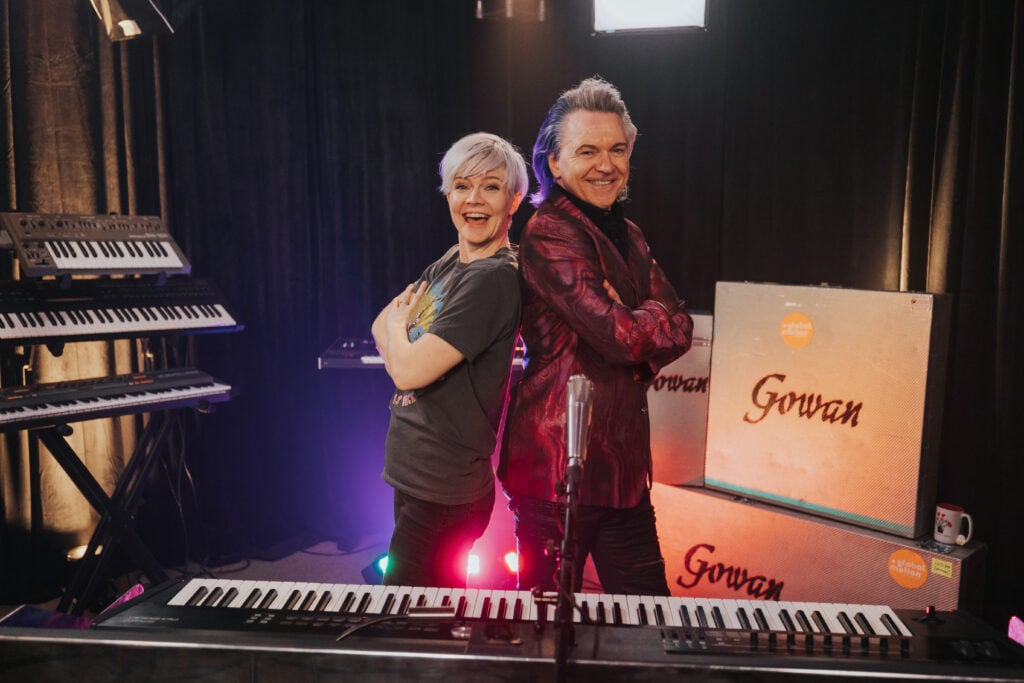
I would like people to look at the instrument as a means to express themselves. And I want Pianote to be the thing that makes them think, “Oh, piano is pretty cool. I wish I could play like that.” And I want their next thought to be: “Oh, I want to learn to do that. And I can because Pianote is able to support me.”
So that’s my big vision: that Pianote becomes what inspires people to play the instrument and what they think about when they’re ready to take that first step.
Right now, if you’ve had the experience of being in the Membership, you know that Pianote is friendly. It’s human in a world that is sort of feeling less human. The thing I always, always, always want to keep is that sense of yes, we’ll provide you with technology and shiny things—and it’s gonna be awesome—but also, we are real people. We are imperfect. We are honest about being imperfect. And we’re going to have conversations with you about this journey that are human.
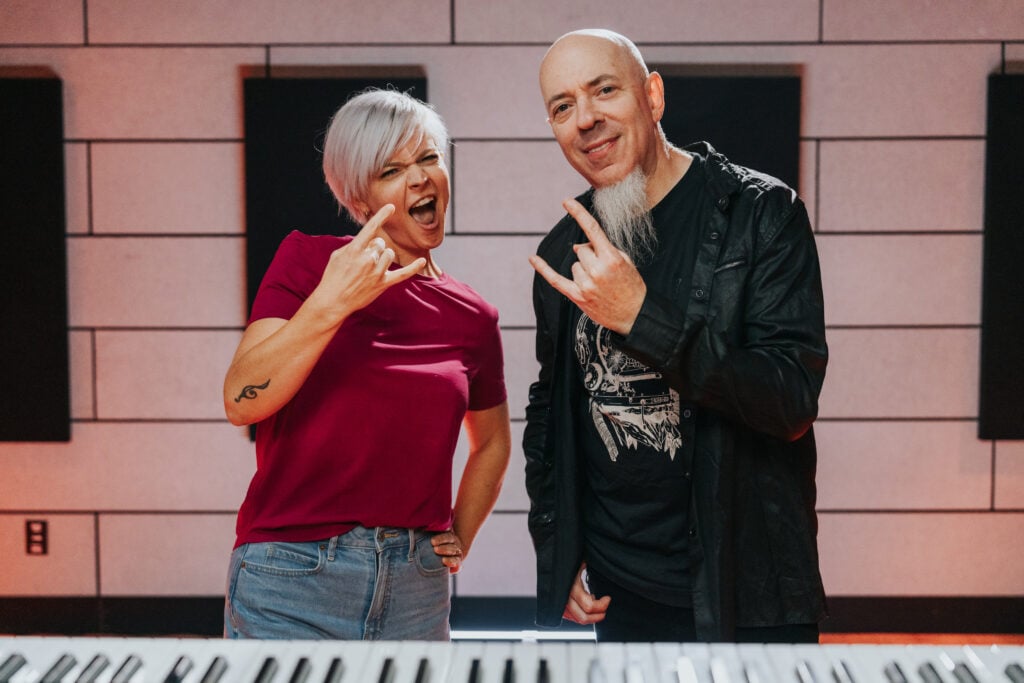
Shakes head vigorously. No! That still doesn’t feel real to me.
I don’t even think I would call it imposter syndrome at this point…though that’s still part of my story.
I feel like there’s nothing else that I could or should be doing. And that I’m so in the experience of a student. I don’t feel connected to being anything other than this clumsy human who’s just trying so hard to keep it together.
I don’t know. I don’t have an answer to this question!
I like piano. It has helped me. I’m not exceptionally good at it. I’m not even very good at it! I just like it.
It’s never come easily and I’ve never felt like I fit into the club of piano players. But what I do know is that I can figure things out in a way that’s maybe a little different, that gives me confidence. So, if I can help other people find that—that bit of confidence—and just accept themselves…
If I can do that, then that’s my “why.”
How do you go from being a homeschooled kid who didn’t get any post secondary education to being a VP of something? I think the answer to that is caring the most. Every time we make a video, I care so hard about how it’s presented, who it’s going to help, the messaging of the video… But I also care deeply about the people that are creating that with me. I just care about everything, and when you look at climbing the quote unquote [corporate] ladder…I didn’t do it the conventional way. And that’s something I’m really proud of. I got there because I cared really, really hard.
Lisa Witt
“How does Lisa take care of Lisa?” That’s a good question…
Definitely my horse. My horse is a big part of it!
I do a lot. I’m not just showing up on camera and doing lessons. I’m trying to nurture a brand and build something and there are a lot of moving parts.
And some of the things that got me here have been…maybe unhealthy. Part of my grit, drive, and motivation has come from a place of wanting to prove that I am good enough or worthy. And there have been periods of time when that has not been healthy. And despite all of the self-care—I can talk about riding horses and journaling and doing yoga and those things are so critical—it’s been difficult to keep things in perspective at times.
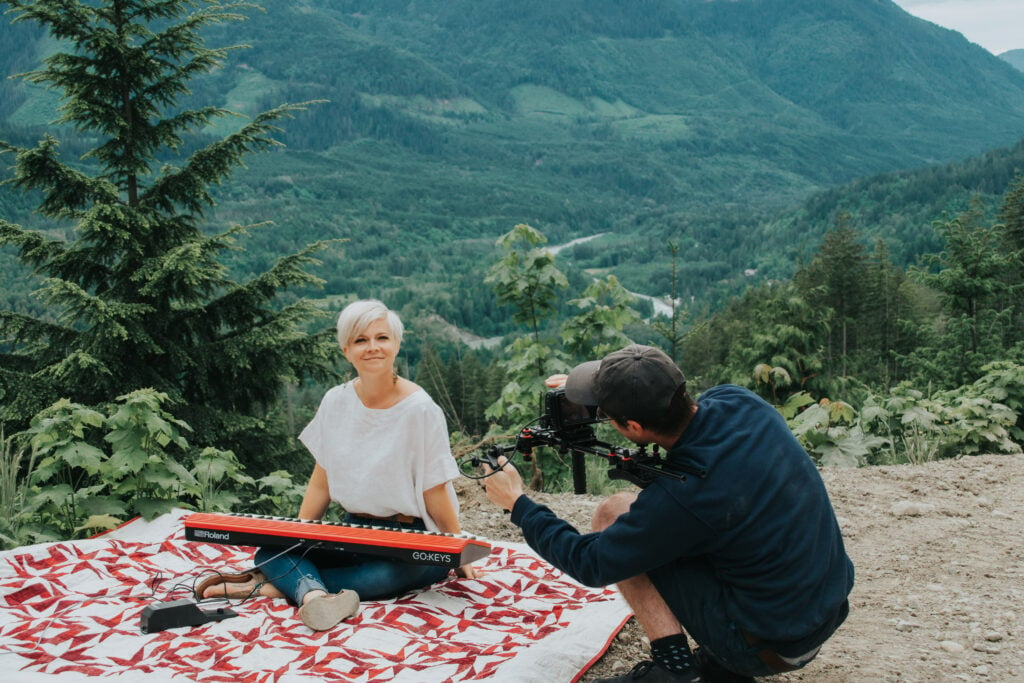
But what’s made it feel possible is…I know I’m doing something important. And when I read comments below videos where people are sharing their stories or that this helped them in some way, it gives me back a lot of energy. So, staying connected to the core reason why I’m doing this has been super central to my ability to continue to do it.
I’ve also found that, because of the way I am, I always need something different. This job is not just teaching piano lessons. I’m learning about algorithms. I’m learning about leadership and building a team. There are so many different parts of my brain that get to develop and grow.
And because Musora is what it is—it’s a place that celebrates individuality, at least in my experience—I feel like I get to develop into that person in my own way. So, if I’m in my office lying on the floor because I’ve just had a complete creative burnout, and somebody walks in, they’re not like: “What the heck? You’re fired!” Instead, they’re like: “Oh hey, you’re having some creative rest. I’ll come back.”
I get to be me. And in a world where we’re all trying to be something that’s not ourselves…that’s a gift.
So, to be able to work and be myself and not be told I have to be different: that’s self-care. That is what has kept me very grounded.
…It also serves as escapism from my life. I get to be a workaholic and not deal with my own problems…
Right?!
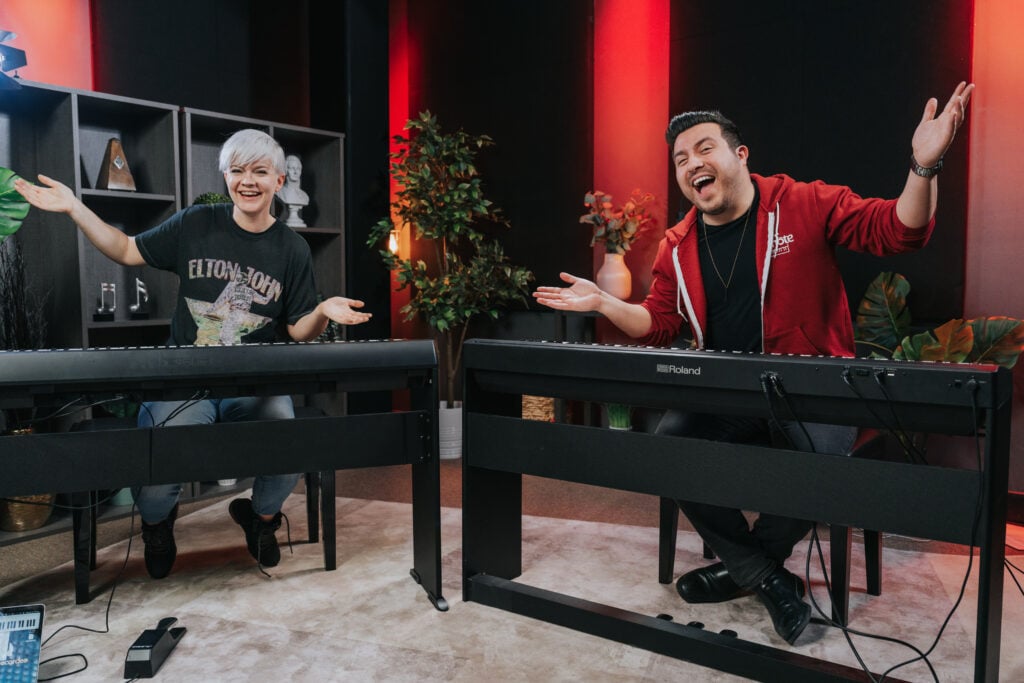
People always think I’m really extraverted. But I’m actually such an introvert.
I love to be alone with my thoughts. I get overstimulated by sounds, smells, and noise. I love to be in nature and to do my yoga. I’m a bit of a woo-woo hippie type in that I will have a conversation with a tree. Or a crow. I need to just sit in silence for three hours and ponder the meaning of life.
I also love to write. I do sit down at the piano by choice almost every day because I love to be in that space. I really do love yoga, feeling my body, and intentional breathing. I think I’m a very spiritual person; I experience energy and I’m just curious about it. I’m curious about life outside of things we see, I guess. That would be very core to who I am as a person.
Oooh. I mean, Pianote is my life right now. So that is my future project, whatever that becomes.
I still would absolutely like to write, develop, and record my own music at some point. That was always the first dream before I became what I am now. It’s something that’s there and I’m sure I’ll get to it in the future. But I do write.
Thanks, Lisa! And happy birthday! 🥳 🦄
The best way to learn piano is with real teachers, but not everyone has the time and money for a private instructor. At Pianote, you can get real feedback from real experts…all from the comfort of your own home. Explore our Method and community yourself with a free 7-day trial.
TRY PIANOTE FOR 7 DAYSCharmaine Li is a Vancouver writer who has played piano for over 20 years. She holds an Associate diploma (ARCT) from the Royal Conservatory of Music and loves writing about the ways in which music—and music learning—affects the human experience. Charmaine manages The Note. Learn more about Charmaine here.


By signing up you’ll also receive our ongoing free lessons and special offers. Don’t worry, we value your privacy and you can unsubscribe at any time.
We use cookies for traffic data and advertising. Cookie Policy »